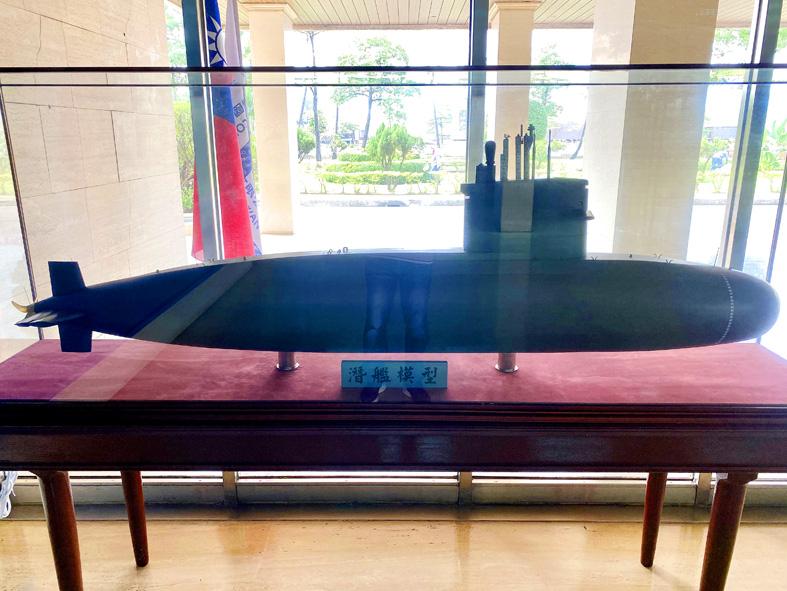A shortage of experts has impeded the development of the military’s indigenous submarine prototype, an advanced trainer jet and an F-16 modernization program, a Ministry of National Defense official said on Friday.
The official made the remarks on condition of anonymity amid an initiative by the ministry to recruit more foreigners with technical expertise to work in Taiwan’s defense sector.
Another source of strain is that foreign technicians and advisers must depart from the country after completing their contract, resulting in constant disruptions, the official said.

Photo: Hung Chen-hung, Taipei Times
The ministry has identified avionics and shipbuilding, as well as shipborne weapons and equipment, and naval platform design, as areas with urgent need of fresh talent, the official said, without elaborating on how much newly hired foreigners would earn and what benefits they would receive.
However, the ministry would try to make their employment packages as attractive as possible, the official added.
“The ministry is offering qualified foreign experts high salaries to make sure that indigenous ship and aircraft programs will meet their delivery schedule, and targets for quality and quantity,” they said.
A preview of the policy showed that foreigners would be allowed to work in the sector if they have a doctorate or equivalent degree in a relevant field, as well as at least five years of experience in military aeronautics or shipbuilding.
The degree requirement would be waived for applicants for positions that Taiwan has problems filling, such as specialists in aviation mechanical or electrical engineering, process engineering, project management, or research and development, it showed.
Also exempt would be specialists with five years of experience in shipborne weapons, equipment and platform design, including performance, structure, propulsion, electrical systems, command and control, auxiliary machinery and outfitting, the document showed.
The positions that could be filled by foreigners would be identified by the ministry or other defense-related agencies based on urgency, it showed.

Intelligence agents have recorded 510,000 instances of “controversial information” being spread online by the Chinese Communist Party (CCP) so far this year, the National Security Bureau (NSB) said in a report yesterday, as it warned of artificial intelligence (AI) being employed to generate destabilizing misinformation. The bureau submitted a written report to the Legislative Yuan in preparation for National Security Bureau Director-General Tsai Ming-yen’s (蔡明彥) appearance before the Foreign Affairs and National Defense Committee today. The CCP has been using cognitive warfare to divide Taiwanese society by commenting on controversial issues such as Taiwan Semiconductor Manufacturing Co’s (TSMC, 台積電) investments in the

INVESTIGATION: The case is the latest instance of a DPP figure being implicated in an espionage network accused of allegedly leaking information to Chinese intelligence Democratic Progressive Party (DPP) member Ho Jen-chieh (何仁傑) was detained and held incommunicado yesterday on suspicion of spying for China during his tenure as assistant to then-minister of foreign affairs Joseph Wu (吳釗燮). The Taipei District Prosecutors’ Office said Ho was implicated during its investigation into alleged spying activities by former Presidential Office consultant Wu Shang-yu (吳尚雨). Prosecutors said there is reason to believe Ho breached the National Security Act (國家安全法) by leaking classified Ministry of Foreign Affairs information to Chinese intelligence. Following interrogation, prosecutors petitioned the Taipei District Court to detain Ho, citing concerns over potential collusion or tampering of evidence. The

‘COMPREHENSIVE PLAN’: Lin Chia-lung said that the government was ready to talk about a variety of issues, including investment in and purchases from the US The National Stabilization Fund (NSF) yesterday announced that it would step in to staunch stock market losses for the ninth time in the nation’s history. An NSF board meeting, originally scheduled for Monday next week, was moved to yesterday after stocks plummeted in the wake of US President Donald Trump’s announcement of 32 percent tariffs on Taiwan on Wednesday last week. Board members voted to support the stock market with the NT$500 billion (US$15.15 billion) fund, with injections of funds to begin as soon as today. The NSF in 2000 injected NT$120 billion to stabilize stocks, the most ever. The lowest amount it

NEGOTIATIONS: Taiwan has good relations with Washington and the outlook for the negotiations looks promising, Minister of Economic Affairs J.W. Kuo said Taiwan’s GDP growth this year is expected to decrease by 0.43 to 1.61 percentage points due to the effects of US tariffs, National Development Council (NDC) Minister Paul Liu (劉鏡清) said at a meeting of the legislature’s Economics Committee in Taipei yesterday, citing a preliminary estimate by a private research institution. Taiwan’s economy would be significantly affected by the 32 percent “reciprocal” tariffs slapped by the US, which took effect yesterday, Liu said, adding that GDP growth could fall below 3 percent and potentially even dip below 2 percent to 1.53 percent this year. The council has commissioned another institution